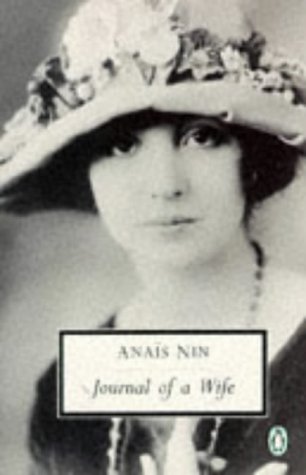

 |

|

The average rating for Journal of a wife based on 2 reviews is 4.5 stars.
Review # 1 was written on 2015-05-03 00:00:00 Fred Rice Fred RiceAt the beginning of this volume, Nin is 20 years old and newly married to Hugh Guiler. Because of Hugh's career the couple decides to move to Paris in 1924 where Nin would spend the next 10 or so years of her life. The first half of this volume was hard to get through. Nin complains a lot about Paris - the dirt, the vulgarity, the rawness. She tries to be the perfect wife, and a lot of entries are gushings over her husband, how perfect he is, how much they are in love etc. It is hard to believe this was written by the same person as The Diary of Anaïs Nin, Vol. 1: 1931-1934 a few years later. About halfway through the book she starts to admit to herself that she is not entirely satisfied with her life and marriage, and this is where things get interesting. This "awakening" is happening slowly and is very fascinating to witness. One can feel that Nin is longing for something, but she doesn't know yet what it is. Another topic in this diary is Nin's struggle with her writing - while she starts some attempts at writing novels, her diary is the only form of expression that she turns to constantly and with ease, and her fear that she will one day only be known for her diaries looms large over her head. This is of course what happened in the end (the exception being her erotic short stories which have gained a certain popularity). To me this is not a bad thing at all and I don't think it means she failed as an artist. I know that some people think differently though (maybe herself included). I can't wait to read the next volume, which closes the gap between her early diaries and her meeting with Henry Miller which would change her life forever. |
Review # 2 was written on 2012-07-18 00:00:00 Michael Foster Michael FosterIn this book Anaïs Nin is a young married woman, but she is also a budding artist. She and Hugo married just after her 20th birthday, and she struggles with the push and pull every young couple struggles with. She and Hugo, or Hugh as she calls him in this book more often, perhaps a sign of increased maturity, decide to leave New York for Paris. She discovers that, despite the fact she has origins there, A.N. despises Paris. She finds it dirty and stifling. She doesn't like what it does to her and Hugh. Hugh's vocation as a banker in Paris is exaggerated. She says that in New York, so many people are ambitious that Hugh feels less pressure to be so. But in Paris, where she characterizes men as weak, she thinks Hugh becomes a competitive and dominate force in business. A.N. spends a great deal of time worrying over Hugh's creative life. While she has much time to write her first attempt at a novel and begin typing up pages of her old diaries, Hugh is exhausted by his job and mostly abandons creative pursuits. She comes to him with this worry in the following exchange: ... Hugh, while whispering, loverlike, sweeter things have ever been written, said: "When will you write again?" "Do you miss it?" I asked incredulously. "Yes. I feel part of the object of my work is lost. I work so that you make create—for both of us." His support of her creative work is strong throughout the book, even if she says the sometimes "quarrel" for days. Still, she and Hugh agree that they have a marriage they are both happy with. Eventually, she and Hugh do some travelling around Europe, and she finds these new locations much more amenable to her creative pursuits. But back in Paris, she struggles to balance household work with her creative work. She measures out the days, saying she will devote half to housework and half to writing. Eventually, they make their way back to New York, where she finds it to be different from how A.N. remembers it. She meets up with her friend Frances, now a reporter at a New York paper, and is shocked she is less engaged with creative work than she remembers her. This serves as a greater symbol for Nin, who often finds those around her are growing up and out of her youthful vigor for writing and reading, but she remains devoted. Though A.N.'s third diary is themed around her early years in marriage, it's clear that the real narrative is her evolution as an artist. She balances her time and energy between her daily duties and her work as an artist. Again, we see her harsh self-criticism. She challenges that no critic could match her own evaluation of her work. In this volume, it's clear that Nin is on the verge of something. |
CAN'T FIND WHAT YOU'RE LOOKING FOR? CLICK HERE!!!